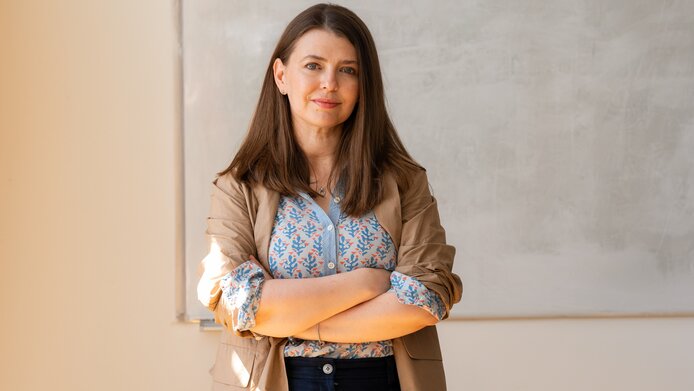How emotions affect language change

You are investigating linguistic conversion and contact-induced language change. Which answers do you hope to find?
Svitlana Antonyuk: We are investigating the mechanisms by which human emotions factor into the process of linguistic conversion and contact-induced language change. Linguistic conversion refers to cases where native speakers of a language give up the language and switch to a different one.
Most of the Ukrainian population is bilingual in Ukrainian and Russian. From a sociolinguistic point of view, it is unusual for people to switch from a more prestigious language to a perceived less prestigious one. Yet on the day of the full-scale invasion, thousands of Ukrainian speakers of Russian converted to Ukrainian as a result of an emotional reaction to the invasion and as a political decision.
Ukrainian and Russian share several lexical items and syntactic structures. The hypothesis is that if speakers harbor negative emotional attitudes towards Russian, they may – consciously or subconsciously - be avoiding constructions within Ukrainian which they associate with Russian.
Personal details
Svitlana Antonyuk is a Lise Meitner Senior Postdoctoral Researcher at the Department of Slavic Studies and Department of German Studies at the University of Graz. She studied English and French Philology at the Yuri Fedkovych National University in Chernivtsi, Ukraine as well as Linguistics at the Stony Brook University of New York, USA where she received her PhD in 2015.
One of our hypotheses is that in switching from Russian to Ukrainian, speakers will be emulating Western Ukrainian dialects, which they associate the least with Russian, since historically, these dialects had the least contact with Russian. We hypothesize that such conscious or subconscious decisions on the part of the speakers of Ukrainian will cause a change in the linguistic system and thus lead to predictable language change.
What are the initial steps you plan to take?
Antonyuk: The first step is going to be to put together a research team, which will consist of three PhD students and a postdoctoral associate.
How do you plan to proceed?
Antonyuk: We are going to be approaching our research question with sociolinguistic as well as neurolinguistic methodology.
We will collaborate with international experts in generative linguistics, comparative linguistics, and Ukrainian and Slavic linguistics.
My team will begin with the empirical investigation and generative theoretic analysis of Ukrainian syntax and morphosyntax, to identify linguistic structures of interest that will serve as input for the sociolinguistic and neurolinguistic investigation. The neurolinguistic part of the project will rely on the method of electroencephalography (EEG) and event-related brain potentials (ERPs) to obtain emotional signatures of syntactic structures. This has never been done before.
My key collaborator is Guilherme Wood, Professor of Neuropsychology at the University of Graz, whose extensive experience in the use of brain imaging methodology is crucial to the success of the experimental part of the project.
What will the FWF START Award mean for your research activities?
Antonyuk: It will give me the very opportunity to conduct this research. I will be able to assemble my own team and attract top talent. Additionally, because of this project, a variety of scientifically, educationally, and socially important initiatives will be realized at the University of Graz. For instance, we are planning to establish a biennial summer school on linguistics which will bring together linguists of various theoretical persuasions, as well as help us identify and establish new collaborations.
About the project
The project “The Emotions We Speak” explores psychological mechanisms underwriting contact-induced language change. As a specific case study, it investigates the process of “linguistic conversion” from Russian to Ukrainian that has been unfolding in Ukraine due to the Russian invasion and aims to develop a general theory of contact-induced language change.
What motivates you in your day-to-day research?
Antonyuk: My work is guided by the overarching goal of trying to understand the complexity of the human mind by studying language as a complex symbolic system that is part of our cognitive endowment.
On a day-to-day basis, I am driven by the desire to understand problems that I am interested in. The feeling of starting to make progress on a challenging problem, of starting to understand, is what it's all about for me.
Do you have any role models?
Antonyuk: I have always been fortunate to be surrounded by people I can respect and admire for their research, integrity, and kindness. I suppose every one of them has contributed to the composite idea of what a researcher should be that I am trying to live up to.
I have great admiration for female researchers who have paved the way for women in science, such as the Austrian physicist Lisa Meitner. My current FWF project is part of the Lise Meitner scheme, and I couldn't be more proud of this association.
I am also very much part of the “Scully-Effect” cohort. Dr. Dana Scully was a fictional character on the TV-series X-files and one of the first female scientists on television. Generations of women went into science because she was their role model, and I consider myself part of this group.
The FWF START Award
The START program of the Austrian Science Fund (FWF) is aimed at outstanding young researchers, giving them the opportunity to plan their research in the long term and with a high degree of financial security. It is endowed with up to €1.2 million and is one of Austria’s most prestigious and most highly endowed awards alongside the FWF Wittgenstein Award.





